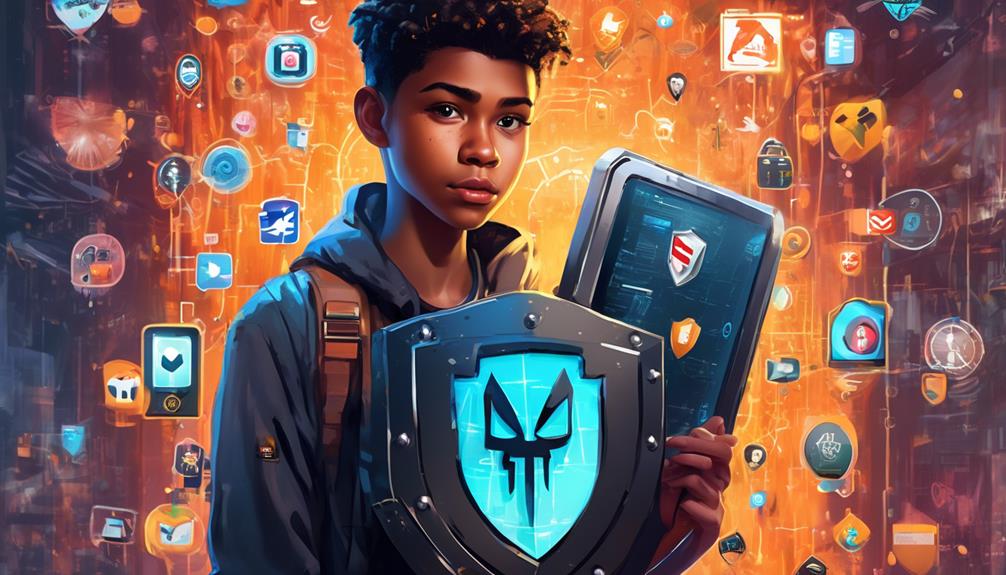Navigating the internet is like sailing for children. They need knowledge and skills to stay safe. Cyber threats and dangers make it essential for them to be equipped. This guide offers insights into cyber safety and internet etiquette. However, there's more to it.
Cybersecurity Education for Children and Teens

The FBI-SOS program offers interactive cybersecurity education for young students, providing a safe online platform. It includes a modern gaming experience for third to eighth graders, addressing internet safety threats. The program operates from September to May, offering a year-round educational platform. It features monthly competitions among schools nationwide, promoting healthy competition. By participating, students gain insights into cybersecurity while having fun. This equips them with essential knowledge for online safety and responsibility.
Personal Communication Scam Prevention and Education
To prevent personal communication scams, caution is key when sharing information online. It's crucial to educate oneself about recognizing and responding to online threats in order to avoid falling victim. Additionally, encouraging open discussions about online safety and appropriate communication behaviors can help protect children from personal communication scams.
Scam Identification Tips
In order to protect against personal communication scams, individuals should be cautious and vigilant. They should watch out for unexpected requests for personal information, especially those that create urgency or use scare tactics. It's crucial to be aware of online safety and cyber citizenship. Educating oneself about common tactics like phishing, pretexting, and social engineering is important. Messages that create urgency should be approached with caution. Avoid clicking on suspicious links or attachments, as they may contain malware. It's also important to verify requests for sensitive information by contacting the organization directly. By staying informed and practicing cyber safety, individuals can better identify and avoid potential threats.
Awareness of Phishing
Remaining vigilant against personal communication scams is crucial. Individuals must be aware of phishing tactics and verify requests for sensitive information. This is especially important for students engaging in online activities. Understanding phishing scams and being cautious about sharing personal information can prevent cyber fraud. The FBI-SOS program provides resources and training on phishing awareness. It emphasizes the significance of never responding to unsolicited requests for personal or financial details. By staying informed and vigilant, individuals can contribute to creating a safer online environment. Educating oneself and others about the risks associated with phishing is essential for a secure online experience.
Safe Online Chatting
When chatting online, prioritize safety to protect from scams and phishing. Stay informed about cyber fraud and use resources from FBI-SOS for internet safety. Avoid sharing personal information and engaging with strangers. Participate in activities promoting cyber safety to foster responsible online behavior.
Teaching Kids About Secure Browsing
When educating children about safe browsing, focus on using kid-friendly search engines and websites. Also, emphasize the importance of not sharing personal information online and using strong passwords. Additionally, discuss the potential risks of clicking on unknown links or pop-up ads. Consider installing parental control tools to monitor and limit online activities. These measures can assist children in navigating the internet safely and responsibly.
Internet Safety Basics
Teaching kids the importance of secure browsing involves using reputable websites and never sharing personal information. Educating students about internet safety basics is crucial, including using strong passwords and recognizing online threats. Understanding parental control tools and participating in programs like FBI-SOS competition can help students gain valuable knowledge. It's essential to regularly discuss internet safety with kids, empowering them to navigate the online world securely and responsibly.
Parental Control Tools
To promote safe browsing, parents can use parental control tools to monitor and regulate their children's online activities. These tools help in limiting access to inappropriate content, setting time restrictions, and blocking specific websites. Additionally, they offer features to track a child's online behavior, including visited websites and app usage. By doing so, parents not only ensure a safer online experience but also educate children about online safety and responsible internet usage. Incorporating parental control tools allows parents to actively contribute to their children's digital education and protect them from potential online threats.
Online Safety Tips for Kids

Instruct children about online safety, including avoiding sharing personal information and recognizing cyberbullying. Teach online etiquette and secure website identification.
Protecting Children From Online Threats
In order to protect children from online threats, it is crucial to educate them about cyberbullying risks. Establishing clear communication channels to address and report incidents is important. Parents and guardians have a vital role in ensuring online safety for children. Open and honest conversations about cyberbullying are essential. Encouraging children to identify and report instances of cyberbullying is necessary. Setting clear guidelines and monitoring online activities can help limit exposure. Building a support network, including knowing your child's friends, is important. Involving school and community leaders can aid in addressing cyberbullying effectively. Looking for signs of cyberbullying and creating a safe space for children to seek help is crucial. Promoting cyber citizenship and utilizing resources like FBI-SOS are proactive steps.
Safe Online Surfing Practices

When using the internet, young people should practice safe habits to protect personal information and stay secure. They can do this by creating strong, unique passwords for each account. It's important to be cautious with unfamiliar links and gifts from unknown sources. Additionally, they should refrain from sharing personal details online and be mindful of content shared on social media.
Frequently Asked Questions
What Is the FBI Releases Online Game to Teach Kids Internet Safety Skills?
The FBI's online game enhances kids' digital security and cyber education, promoting safe surfing and responsible online behavior. By engaging in online gaming, kids learn vital internet skills.
What Are the Internet Safety Rules for Kids?
Children must always be supervised by parents when online and utilize privacy settings for protection. They should also be cautious of strangers, prevent cyberbullying, safeguard their passwords, and practice safe browsing. Additionally, they must adhere to online etiquette and be vigilant against online scams.
What Is Cyber Safety for Students?
Cyber safety for students encompasses parental controls, digital citizenship, and understanding social media. Additionally, it involves awareness of online predators, privacy settings, and cyberbullying prevention. It also includes ensuring password security and safe browsing habits to promote responsible online behavior and protect personal information.
Conclusion
In summary, the 'Guide to Safe Online Surfing for Youngsters' lays the groundwork for children's cybersecurity education. By instructing kids about secure browsing and online safety through interactive games, it empowers them with the knowledge and skills to navigate the digital world responsibly. Similar to how a lighthouse guides ships through turbulent waters, this program lights the way to safe online surfing for children, shielding them from online threats and fostering good cyber citizenship.



